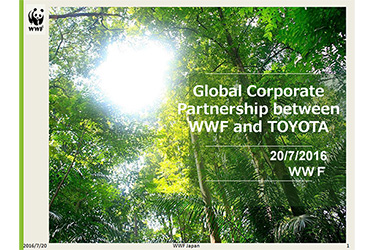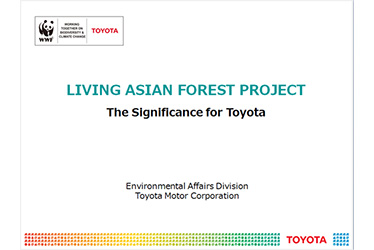Jul. 20, 2016

WWF and Toyota Form Global Partnership,
Join Forces on Living Asian Forest Project and Climate Change
TOKYO (July 20, 2016)―WWF and Toyota Motor Corporation have entered into a five-year agreement aimed at accelerating the globe's transition to sustainability. Through this partnership, the organizations will work together to promote biodiversity conservation, raise environmental awareness and accelerate the move toward a "zero carbon" society.
Toyota is the first car company and the first Japanese company to sign a Global Corporate Partnership agreement with WWF. The agreement went into effect on July 1, 2016.
As part of the partnership, Toyota will support the Living Asian Forest Project, a new series of existing and planned WWF activities to conserve tropical forests and wildlife in Southeast Asia. The project will take place in WWF priority places Borneo (Kalimantan) and Sumatra in Indonesia. In the future, the project will expand to the Greater Mekong region.
The project will also focus on increasing the sustainability of natural resources such as wood, paper and pulp, palm oil and natural rubber. Unsustainable production and use of these commodities are among the main causes of deforestation and increased threats to endangered species in these regions.
Toyota will donate US$1 million to the Living Asian Forest Project in 2016 and will continue its support for a total of five years. The support strengthens efforts toward achieving the Toyota Environmental Challenge 2050 goals of aiming to reduce Toyota's environmental footprint to zero, while creating value and producing benefit to society in the face of global-scale environmental issues. The Living Asian Forest Project will specifically help accomplish one of the six challenges: to establish a future society in harmony with nature.
With demand expected to rise for natural rubber―the main resource for car tires―the partnership recognizes that the sustainable production and use of natural rubber is required for forest ecosystem conservation. Toyota acknowledges the environmental and social challenges surrounding natural rubber, and will collaborate with industries and stakeholders to contribute to international standard-setting as well as other related activities that WWF promotes.
Throughout the partnership, WWF and Toyota will also work together to help realize a zero carbon society. In order to successfully meet the company's Zero CO2 Emissions Challenges under its Toyota Environmental Challenge 2050, Toyota has already joined the Science Based Targets initiative that is aimed at helping companies combat climate change.
Didier Leroy, Executive Vice President of Toyota, said: "We share the same vision as WWF: to achieve a truly sustainable society and leave a living planet for future generations. When we started working on concrete actions to achieve our Environmental Challenge 2050, we decided that joining forces with non-governmental organizations which are experts in their field was essential. Our partnership, and projects like the Living Asian Forest Project, are among the most effective ways for a company like ours to make a positive impact and raise awareness among our employees, suppliers, and customers of the importance of sustainable resource management."
Marco Lambertini, Director General of WWF International, said: "WWF is delighted to join forces with Toyota in order to accelerate efforts needed to prevent the dangerous degradation of the natural systems we all depend on. Science has never been clearer and awareness of the problems and solutions to the many environmental challenges that the world is facing has never been greater. We need more private sector organizations like Toyota to step up and find solutions to these challenges. WWF commends Toyota's vision to help make a safer, healthier more sustainable world a reality for future generations and our living planet."
Arnold Sitompul, Conservation Director of WWF Indonesia, said: "One of the exciting outcomes of this partnership will be the strengthening of our work to conserve tropical forest ecosystems in Kalimantan and Sumatra. These are important homes for critically endangered species, and essential proving grounds for the sustainable management of natural resources."
- WWF Global Corporate Partnership
- This partnership is based on a common understanding of issues, shared ambitions or activities, and a willingness to speak out in public. Typically, three types of cooperation with a partner company will be implemented in the partnership; (a) driving sustainable business practices; (b) communications and awareness raising; and (c) philanthropic contributions to support WWF conservation projects.
- Toyota Environmental Challenge 2050
- With the aim of contributing to the sustainability of the global environment, in October 2015, Toyota had announced the Toyota Environmental Challenge 2050. Toyota is taking on new challenges that consider the world 20 or 30 years in the future that will help address key global environmental issues such as climate change, water shortage, resource depletion, and degradation of biodiversity. The Toyota Environmental Challenge 2050 aims to reduce the negative impact of manufacturing and driving vehicles to zero, and also, to create value and produce benefit to society. The challenge is composed of six individual challenges across three areas: ever-better cars, ever-better manufacturing, and enriching lives of communities. http://www.toyota-global.com/sustainability/environment/challenge2050/
- Science Based Targets initiative
- The Science Based Targets is a collaborative initiative by WWF, CDP, WRI, and the UN Global Compact to support companies to set emission reduction targets in line with what the science says is necessary to keep global warming well below the dangerous threshold of 2°C. The initiative provides a range of guidance documents and tools to support target setting processes. More than 160 companies worldwide have committed to setting such ambitious climate targets (as of July 1, 2016).
- About WWF
- WWF is one of the world's largest and most respected independent conservation organizations, with over five million supporters and a global network active in more than 100 countries. WWF's mission is to stop the degradation of the earth's natural environment and to build a future in which humans live in harmony with nature, by conserving the world's biological diversity, ensuring that the use of renewable natural resources is sustainable, and promoting the reduction of pollution and wasteful consumption.
Please refer to www.panda.org/news for the latest news and media resources on the WWF.
- About Toyota
- Founded in 1937, Toyota is a global automotive company with production in 29 countries and sales in more than 170 countries.
The "Living Planet Index"*1 had decreased by more than 50% during the period from 1970 to 2010 with a particularly significant decrease of 56% in the tropics ("Living Planet Report 2014"). While tropical forests in Southeast Asia, one of the mega-biodiversity spots in the world, still hold valuable ecosystems, its forests have been lost drastically.
As part of the Toyota and WWF partnership the "Living Asian Forest Project" will aim, at helping the conservation of tropical forests and wildlife in Southeast Asia. Projects include landscapes inside WWF's priority places in Borneo (Kalimantan) and Sumatra. In the future and depending on the results of the initial local initiatives, the project may expand to the Greater Mekong region, across Cambodia, Laos, Myanmar, Thailand and Vietnam.
Unsustainable production and use of key commodities has been one of the main reasons of deforestation and increased threats to endangered species in the regions. The project activities will therefore focus on increasing the sustainability of natural resources such as wood, paper and pulp, palm oil and natural rubber. The project will also include wildlife surveys, restoration of forests, and community empowerment. The inclusion of work on commodities is to implement WWF's "One Planet Perspective"*2 vision which calls for better choices for managing, using and sharing natural resources, and this framework provides a set of effective activities in order to conserve biodiversity and forests also as important storage of CO2 in the regions.
As for natural rubber which is the main material of automobile-tire and other products, the partnership will work on promoting sustainable natural rubber. It is expected that the demand for natural rubber will expand in the subsequent years, and the sustainable production and use of natural rubber is required for forest ecosystem conservation.
Toyota recognizes environmental and social challenges surrounding natural rubber and collaborates with industries and stakeholders to positively contribute to international standard setting for sustainable natural rubber and other activities which WWF promotes.
*1Living Planet Index ("LPI")
Based on trends in 10,380 populations of 3,038 mammal, bird, reptile, amphibian and fish species, WWF and ZSL (Zoological Society of London) calculate and report the LPI, to evaluate the status of world's biodiversity every two years. The LPI shows a decline of 52% between 1970 and 2010, which suggests that, on average, vertebrate species populations are about half the size they were 40 years ago.
*2Better Choices from a One Planet Perspective
WWF proposes "One Planet Perspective," which outlines better choices for managing, using and sharing natural resources within the planet's limitations, so as to ensure food, water and energy security






